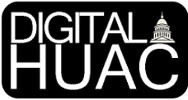
About the Project
Digital HUAC seeks to transform the elusive House of Un-American Activities Committee testimonies into an accessible research environment. Through an online repository, users will be able to search across Digital HUAC's current collection of HUAC hearings. This project was born in a Digital Humanities Praxis course at the Graduate Center, CUNY. Project members are Sarah Cohn, Chris Meatto, Juliana Son and Daria Vaisman. Other projects created in this class are: NYC Fashion Index, TANDEM, and CUNYcast.
Challenges with the Current State of HUAC Records
Currently, the entirety of the HUAC corpus is spread out over a variety of locations. Most appear in hardcopy form. Those that are digitized tend to exist in isolation or alongside a small number of related testimonies, bearing little if any metadata, likely unstandardized. Conducting research across hundreds of hearings is prohibitive. For too long, the number, scope, and scale of the hearings themselves--qualities in source materials that call out for thorough consideration--have prevented scholars and casual researchers from meaningful analysis.
Our Solution: Digital HUAC
Digital HUAC seeks to fundamentally improve how researchers interact with the history of HUAC itself by:
Currently users are able to perform extensive searches across a curated collection of HUAC testimony. Our next phase of development includes a data export functionality through an API to perform textual analysis. Digital HUAC will empower users to chart their own course of analysis, ranging from the textual to the thematic.
Why is this important?
Along with creating an accessible environment of HUAC material, the Digital HUAC team is also building a roadmap for other scholars who are also interested in creating an interactive archive of historical material. Thinking as researchers, we have developed a search functionality, based on a thoughtful taxonomy, that would render the collection useful for various types of research, across disciplines.
Use Cases
Comparative Political Analysis
Anxieties of national security are not limited to the Cold War era. Throughout history and the present, such fears have led to the expansion of government investigative powers and public debates on data privacy, surveillance of citizens, and the closed court systems, such as the U.S. Foreign Intelligence Surveillance Act Court. The tension between protecting national security and preserving individual privacy is likewise reflected in the HUAC transcripts.
Conducting searches via Digital HUAC, such as year, investigator, witness, could help analyze
Linguistic Analysis of Social Discourse in Court Trials
Along with historians, this digital archive of testimonies would also be of interest to linguists. Testimonies are a unique form of historical record. Like oral histories, they capture the spoken discourse of the time. As a legal document, testimonies also capture the ‘dynamic interaction’ between prosecution and defendant, jury and witnesses. At an unprecedented scale, Digital HUAC now allows researchers to utilize digital methodology to analyze American Cold War history in the words of its participants. Research questions inlcude
Recent advances in computational linguistics have allowed for the analysis of large collections of written and oral texts, yet there has been almost no work on computational analysis of court trials. Digital HUAC has created an environment where such projects are possible.